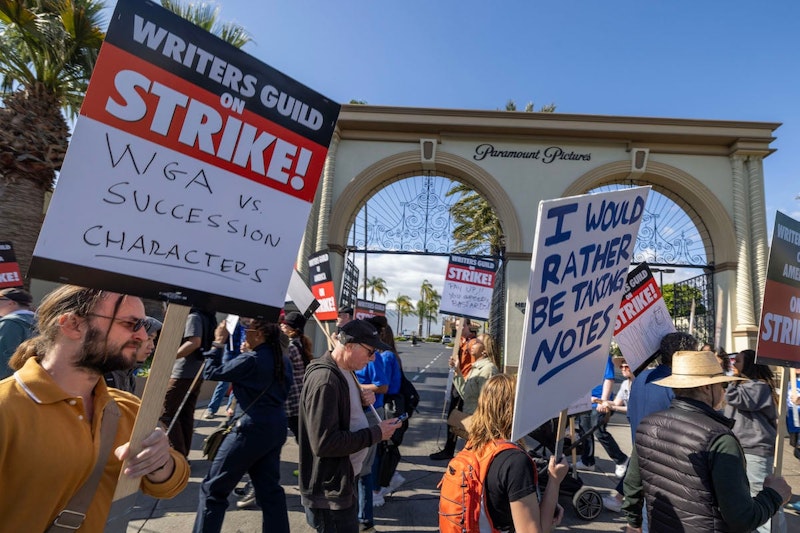A sharpened stick in the sand. A quill dipped in squid ink, scribbling onto papyrus. Pounding away on a typewriter. Opening to a new page in a yellow legal pad, and picking up a pen. And now, most often, typing on a computer keyboard. Most written words are forgotten. A few have been repeated often enough to be remembered by those that were taught to read and write themselves. In 1454, Gutenberg and his prototype printing press went commercial. The church rejoiced. Some still refer to the Bible as "The Good Book." A pitcher named Tanner Bibee just arrived in the majors with Cleveland. When I wrote his name, my phone autocorrected his name to "Tanner Bible.”
In America, we’ve generally replaced our bibles with streaming television. Imagine finishing your day and cracking open a bible. The seeds of some of those stories are now re-written as television shows. Let’s turn to the writers, most of whom have struggled for as long as they've attempted to make a living as writers. They’re now struggling more.
The Writers Guild of America recently went on strike after negotiations fell apart between their union and the Alliance of Motion Picture and Television Producers. Production in film and television faced a similar shutdown in November, 2007. That strike lasted until February. At that time, few had heard of the phrase “streaming television.” You were lucky if your internet video loaded in under 30 seconds. Today, as streaming television has taken over, supply and demand has increased, but as with most aspects of internet-driven media the workers who create these shows are more disposable and more desperate to earn a living.
A season of a new show might last six episodes. During the pandemic, writer's rooms shifted to Zoom. For many lower-budget studios, Zoom is where they'll remain. Entry-level writers are always banging on the door, eager to find their way into the industry, while seasoned writers aren't willing to work for minimum wage. The Writer’s Guild is also seeking protections against "mini-rooms." These are skeleton-crew versions of writer's rooms. Instead of six writers, they might have two or three. Instead of signing a contract for three weeks per episode, they might have one week. They might not be guaranteed work for the full eight-episode season. The cuts to these budgets are so severe that some shows have ended their writer's rooms meetings before a show's finale, as was the case with Ali Wong's one-note retaliation series Beef. Turns out the writing for Beef was too lean.
There's also the proliferation of shows made as "Second Screen Content." Shows made cheaply, written haphazardly, with the goal of serving as a kind of visual muzak for the viewer. In these cases, it’s expected that the viewer will be staring into their mobile device while the show plays in the background. Artistic production values, attention to a character's background, dialogue, or even plot consistency, these factors are breezed through when the goal of the entertainment is background noise.
Second-screen content is on the rise. From Digital Turbine, "65% of internet users aged 35-44 said they used their mobile phones often while watching television. More than half of users (53%) aged 45-54 also said they second screened with their smartphones. A significant number of Baby Boomers (41%) are still using their mobile devices as second screens and we expect this share to grow as they become more accustomed to multitasking with media." You might argue, “It’s just what we do now. Maybe it’s not a problem to half-watch a show.” Maybe once in a while. But if that’s your preferred way of watching, you’re training yourself to half-pay attention. With smart phones and tablets, we live in a multi-tasking universe and wonder why our thoughts get away from us and often lead us into a general sense of isolation and depression.
This brings us to Chat GPT. Why pay a human to write something a machine-learning device can "almost" replicate?*
*by almost, I mean write by copying-and-pasting. Filtering through regurgitated material.
At a recent Writers Guild Protest, a writer held a sign that read "Chat GPT Doesn't Have Childhood Trauma." It’s through adversity we feel the need to communicate universal truths in storytelling. Without conflict, a story doesn't have a hook. The worst television shows and films are always formulaic and unoriginal. Unfortunately, the entertainment industry has grown far beyond art and gradually become a billion-dollar enterprise, based on formulas and now... algorithms.
The general rule: the bigger a budget, the safer a screenplay. Streaming shows, independent studios and the internet have enabled a much wider range of stories to be told in the last decade. But there’s a new problem: we have to put our phones down and watch the shows or there will be nobody left to write them. Or the only people left to write them will be willing to work for next-to-nothing. Another sign at one of the rallies: Writer: "I Have a Family to Feed." Studio: "Who Told You to Have a Family?"

